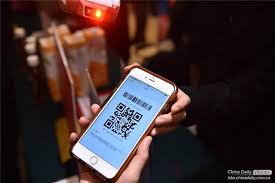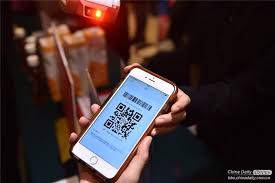
In China, an audacious economic phenomenon is taking place.
How China is systematically and rapidly doing away with paper money and coins is the issue rather than debt, infrastructure spending or the other major economic topics du jour. It has to do with cash.
A smartphone to pay for just about everything is being used by almost everyone in major Chinese cities. Before bringing up cash as a third, remote possibility, a waiter will ask if you want to use WeChat or Alipay — the two smartphone payment options, at restaurants.
How quickly the transition has happened is just as startling. Simply because everyone was still using cash, there would be no question at all only three years ago.
"From a tech standpoint, this is probably one of the single most important innovations that has happened first in China, and at the moment it's only in China," said Richard Lim, managing director of venture capital firm GSR Ventures.
One has to see to believe certain parts of the Chinese internet. Until you are forced to do without them, it's hard to comprehend that Facebook or Google can be completely blocked, coming from outside the country. until the sixth person of the day asks to scan your QR code — a sort of bar code — to connect the two of you, it's tough to fathom how critical the messenger app WeChat is for everyday life.
"It has become the default way of life now," said Shiv Putcha, an analyst with the research firm IDC. "Literally every business and brand in China is plugged into this ecosystem."
Some Scandinavian countries still use cards frequently even though they have also weaned themselves from cash. The change has been to phones in China.
This means that sitting atop a gold mine of staggering proportions are Tencent and Alibaba's financial affiliate, Ant Financial, the two Chinese internet companies that run WeChat and Alipay, respectively. Both companies can collect the payments data to be used in everything from new credit systems to advertising while they can make money off the transactions and charge other companies to use their payment platforms.
In the coming year, set to surpass credit card companies like Visa and Mastercard in total global transactions per day are Ant Financial and Tencent according to recent data, Mr. Lim said. Instead of an expensive card reader, partly by allowing smaller vendors to make use of a simple printout of a QR code or their phone, the key is that both companies are able to provide payments on the cheap. Instead of having to communicate with a bank, a back-end system that stores a record of user accounts also helps keep costs down.
Driven largely by mobile payments, the "other services" item in its earnings almost tripled from a year earlier to 6.4 billion renminbi, or $940 million in the fourth quarter, for Tencent, even while the company does not break out what it makes from mobile payments.
But with China's sweeping embrace of online payments, there are some potential future problems. It is slowly locking out people unable to get onto those networks, and locking itself into those companies as the country builds its entire consumer economy around two private smartphone payment platforms.
For tourists and business travelers, they will find it hard to turn their phones into wallets as they are unlikely to open a bank account in China and that makes their life difficult in China.
(Source:www.cnbc.com)
How China is systematically and rapidly doing away with paper money and coins is the issue rather than debt, infrastructure spending or the other major economic topics du jour. It has to do with cash.
A smartphone to pay for just about everything is being used by almost everyone in major Chinese cities. Before bringing up cash as a third, remote possibility, a waiter will ask if you want to use WeChat or Alipay — the two smartphone payment options, at restaurants.
How quickly the transition has happened is just as startling. Simply because everyone was still using cash, there would be no question at all only three years ago.
"From a tech standpoint, this is probably one of the single most important innovations that has happened first in China, and at the moment it's only in China," said Richard Lim, managing director of venture capital firm GSR Ventures.
One has to see to believe certain parts of the Chinese internet. Until you are forced to do without them, it's hard to comprehend that Facebook or Google can be completely blocked, coming from outside the country. until the sixth person of the day asks to scan your QR code — a sort of bar code — to connect the two of you, it's tough to fathom how critical the messenger app WeChat is for everyday life.
"It has become the default way of life now," said Shiv Putcha, an analyst with the research firm IDC. "Literally every business and brand in China is plugged into this ecosystem."
Some Scandinavian countries still use cards frequently even though they have also weaned themselves from cash. The change has been to phones in China.
This means that sitting atop a gold mine of staggering proportions are Tencent and Alibaba's financial affiliate, Ant Financial, the two Chinese internet companies that run WeChat and Alipay, respectively. Both companies can collect the payments data to be used in everything from new credit systems to advertising while they can make money off the transactions and charge other companies to use their payment platforms.
In the coming year, set to surpass credit card companies like Visa and Mastercard in total global transactions per day are Ant Financial and Tencent according to recent data, Mr. Lim said. Instead of an expensive card reader, partly by allowing smaller vendors to make use of a simple printout of a QR code or their phone, the key is that both companies are able to provide payments on the cheap. Instead of having to communicate with a bank, a back-end system that stores a record of user accounts also helps keep costs down.
Driven largely by mobile payments, the "other services" item in its earnings almost tripled from a year earlier to 6.4 billion renminbi, or $940 million in the fourth quarter, for Tencent, even while the company does not break out what it makes from mobile payments.
But with China's sweeping embrace of online payments, there are some potential future problems. It is slowly locking out people unable to get onto those networks, and locking itself into those companies as the country builds its entire consumer economy around two private smartphone payment platforms.
For tourists and business travelers, they will find it hard to turn their phones into wallets as they are unlikely to open a bank account in China and that makes their life difficult in China.
(Source:www.cnbc.com)





